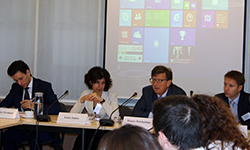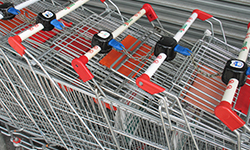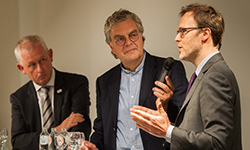BusinessEurope Headlines No. 2016-32
Freedom values are the foundation of a United Europe
 Drawing the lessons of the three days of lively debates at the European Forum for New Ideas - EFNI 2016, the Director General of BusinessEurope, Markus J. Beyrer, said “European business strongly believes in the European Union. These are testing times but all the big challenges facing us today (security, migration, the decision of the United Kingdom to leave the European Union, climate change, economic and social development, etc.) have an international dimension. Efficient solutions can only be found if we work together at European level, without cherry picking between the four freedoms of the Single Market.” The importance of freedom values as the foundations of a united Europe was also the key message of the Sopot declaration presented by Henryka Bochniarz, President of BusinessEurope’s Polish member federation Lewiatan, and Jerzy Buzek, President of the Industry Committee of the European Parliament, during the closing of EFNI 2016 on 30 September.“ Free movement of people, services, goods and capital are the DNA of the European Union. And these freedoms are also the enemy of anti-democratic ideologies”, added Director General Beyrer.
Drawing the lessons of the three days of lively debates at the European Forum for New Ideas - EFNI 2016, the Director General of BusinessEurope, Markus J. Beyrer, said “European business strongly believes in the European Union. These are testing times but all the big challenges facing us today (security, migration, the decision of the United Kingdom to leave the European Union, climate change, economic and social development, etc.) have an international dimension. Efficient solutions can only be found if we work together at European level, without cherry picking between the four freedoms of the Single Market.” The importance of freedom values as the foundations of a united Europe was also the key message of the Sopot declaration presented by Henryka Bochniarz, President of BusinessEurope’s Polish member federation Lewiatan, and Jerzy Buzek, President of the Industry Committee of the European Parliament, during the closing of EFNI 2016 on 30 September.“ Free movement of people, services, goods and capital are the DNA of the European Union. And these freedoms are also the enemy of anti-democratic ideologies”, added Director General Beyrer.
![]()
![]() Contact: Thérèse de Liedekerke
Contact: Thérèse de Liedekerke
Negotiators should accelerate the EU-Japan FTA negotiations
 “European business expects an ambitious FTA in which substance prevails over timing, but what we need now is acceleration on the substance”, said Director of International Relations Luisa Santos at a breakfast meeting during the 17th round of EU-Japan FTA negotiations. The EU and Japan negotiations have been ongoing for over three years and both sides will need to make decisions on the conditions for concluding the FTA, if we want to reach the political objective of concluding by the end of 2016. “Negotiations have accelerated over the past few months”, added EU Chief Negotiator Mauro Petriccione. BusinessEurope and Keidanren recently sent a joint letter to leaders on both sides outlining our expectations, called on the negotiators to heed the joint views of European and Japanese business representatives.
“European business expects an ambitious FTA in which substance prevails over timing, but what we need now is acceleration on the substance”, said Director of International Relations Luisa Santos at a breakfast meeting during the 17th round of EU-Japan FTA negotiations. The EU and Japan negotiations have been ongoing for over three years and both sides will need to make decisions on the conditions for concluding the FTA, if we want to reach the political objective of concluding by the end of 2016. “Negotiations have accelerated over the past few months”, added EU Chief Negotiator Mauro Petriccione. BusinessEurope and Keidanren recently sent a joint letter to leaders on both sides outlining our expectations, called on the negotiators to heed the joint views of European and Japanese business representatives.
![]() Contact: Maurice Fermont
Contact: Maurice Fermont
How to improve mutual recognition for products?
 No effective mechanism exists to check whether national rules that frustrate the single market access of products are proportionate to achieve their public interest objective or are in fact non-discriminatory. As a result, mutual recognition has eroded overtime as a principle that should permit national rules to coexist without restricting the free movement of goods. This was the central focus of BusinessEurope’s response to the Commission’s public consultation on the potential revision of the mutual recognition Regulation. In 2014 alone, 700 national technical regulations were applied representing additional labelling, testing and design rules for products to fulfil, even though they were already being lawfully marketed. BusinessEurope believes the “quick-assessment procedure” will raise transparency among Member States to ensure mutual recognition is better applied in practice.
No effective mechanism exists to check whether national rules that frustrate the single market access of products are proportionate to achieve their public interest objective or are in fact non-discriminatory. As a result, mutual recognition has eroded overtime as a principle that should permit national rules to coexist without restricting the free movement of goods. This was the central focus of BusinessEurope’s response to the Commission’s public consultation on the potential revision of the mutual recognition Regulation. In 2014 alone, 700 national technical regulations were applied representing additional labelling, testing and design rules for products to fulfil, even though they were already being lawfully marketed. BusinessEurope believes the “quick-assessment procedure” will raise transparency among Member States to ensure mutual recognition is better applied in practice.
![]()
![]() Contact: Patrick Grant
Contact: Patrick Grant
Going for fit-for-purpose consumer rules
 We support the objectives of the online consumer and marketing law REFIT exercise. BusinessEurope advocates for more clarity and efficient enforcement of existing rules rather than adding new requirements. Because some of the current consumer directives under REFIT are decades’ old, before developments like social media or collaborative economy, it is important to assess how the rules fit to these realities. These were Businesseurope’s key messages at a Hearing in the European Economic and Social Committee on Consumer/Marketing REFIT on 5 October.
We support the objectives of the online consumer and marketing law REFIT exercise. BusinessEurope advocates for more clarity and efficient enforcement of existing rules rather than adding new requirements. Because some of the current consumer directives under REFIT are decades’ old, before developments like social media or collaborative economy, it is important to assess how the rules fit to these realities. These were Businesseurope’s key messages at a Hearing in the European Economic and Social Committee on Consumer/Marketing REFIT on 5 October.
Contact: Pedro Oliveira
Why industrial policy must be high up on EU’s agenda
 A strong and vibrant industry is the backbone of the EU’s economy and guarantor of our living standards. Strengthening industry and providing the right framework conditions at EU level is therefore important. Hence, “No one can deny that the EU needs a new industrial policy. The commitment of the European Commission is key. We expect it to take actions in the next months”, said Director for Industrial Affairs Alexandre Affre last week in Brussels. He spoke, together with Commission and trade union representatives, at the dialogue on industrial policy hosted by the German alliance for the "Future of Industry". The moment is decisive because the Commission will adopt its 2017 work programme within the coming weeks. The Alliance of a Competitive European Industry is calling on the EU to incorporate a dedicated communication with an ambitious roadmap on EU industrial policy.
A strong and vibrant industry is the backbone of the EU’s economy and guarantor of our living standards. Strengthening industry and providing the right framework conditions at EU level is therefore important. Hence, “No one can deny that the EU needs a new industrial policy. The commitment of the European Commission is key. We expect it to take actions in the next months”, said Director for Industrial Affairs Alexandre Affre last week in Brussels. He spoke, together with Commission and trade union representatives, at the dialogue on industrial policy hosted by the German alliance for the "Future of Industry". The moment is decisive because the Commission will adopt its 2017 work programme within the coming weeks. The Alliance of a Competitive European Industry is calling on the EU to incorporate a dedicated communication with an ambitious roadmap on EU industrial policy.
![]() Contact: Nicolas Rathauscher
Contact: Nicolas Rathauscher
Calendar
 10 October 2016: Eurogroup
10 October 2016: Eurogroup- 11 October 2016: Economic and Financial Affairs Council
- 11 October 2016: High-level conference EU ETS reform and investment leakage Myth or reality?
- 13 October 2016: Employment, Social Policy, Health and Consumer Affairs Council